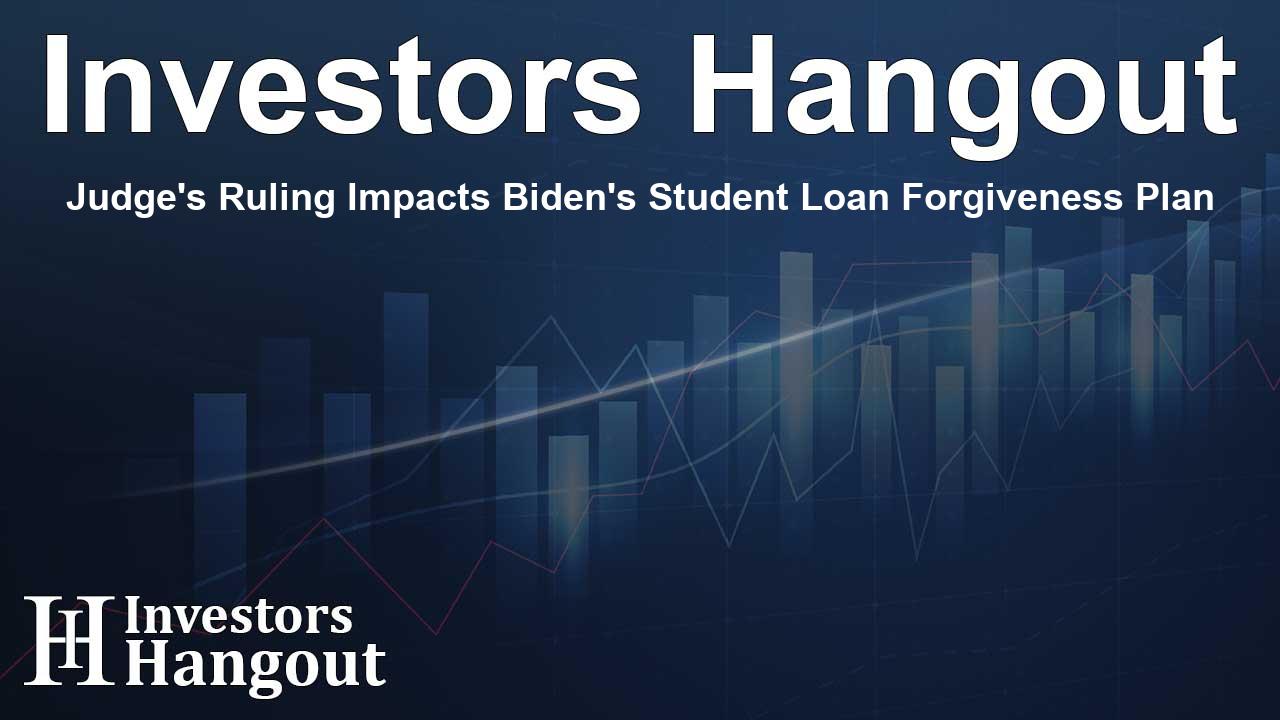Judge's Ruling Impacts Biden's Student Loan Forgiveness Plan

Recent Legal Developments on Student Loan Forgiveness
A recent ruling by a federal judge has introduced significant changes to a legal challenge surrounding the Biden administration's plan for student loan forgiveness. This case has been a focal point for Republican-led states, and the latest decision could reshape the trajectory of economic relief for millions of borrowers.
Judge's Decision to Transfer Case
U.S. District Judge J. Randal Hall notably removed Georgia from the legal challenge aimed at the administration's plan to forgive student debt valued at $73 billion. His determination to shift the case from Georgia to Missouri has raised questions about the standing of states in matters relating to federal regulatory actions.
Importance of Legal Standing
Judge Hall concluded that Georgia did not demonstrate sufficient harm to assert its standing in the lawsuit against the U.S. Department of Education. Although Georgia claimed potential tax revenue losses from the forgiveness of loans, the court found this assertion inadequate, deeming that the proposed rule did not target state income taxes but was rather a broader educational policy initiative.
Impact on Missouri's Position
The state of Missouri, however, has been upheld as a valid party in the lawsuit since it manages a nonprofit student loan servicing entity that stands to lose direct funding due to the proposed debt relief measures. This distinction underscores the varied implications of federal initiatives across different states.
Overview of the Debt Forgiveness Plan
The premise of the proposed regulation is to benefit approximately 27.6 million student borrowers. It aims at providing relief to those who owe more than their original student loan amounts, especially those with prolonged payment histories of over two decades, and others who qualify under previous forgiveness initiatives.
Responses from the Administration
In light of these developments, a spokesperson from the Department of Education expressed gratitude for the court's ruling that effectively sidelined Georgia from the lawsuit. This response reflects the administration's commitment to ensuring that extensive numbers of borrowers are granted sufficient relief and not hindered by state-level legal actions.
Controversies Surrounding the Plan
The Biden administration has long maintained that the current student loan system is flawed, putting undue financial stress on individuals seeking higher education. Yet, opposition from Republican officials emphasizes concerns regarding overreach, arguing that such policies unfairly favor college-educated individuals while leaving others without similar assistance.
Next Steps in the Legal Battle
As the case proceeds in Missouri, the states involved have moved to secure a swift ruling from the court about whether the challenge should continue. This next step will be pivotal, potentially impacting the implementation of the debt relief measures proposed as part of the administration’s educational reforms.
The evolving landscape of legal interpretations and stakeholder reactions highlights a growing tension around federal student loan policies. As the litigation unfolds, the fate of the student debt forgiveness plan will undoubtedly influence many lives and the ongoing discourse surrounding education funding in America.
Frequently Asked Questions
What was the recent ruling regarding student loan forgiveness?
A federal judge ruled to remove Georgia from the lawsuit challenging Biden’s student loan forgiveness plan, shifting the case mainly to Missouri.
Why was Georgia's involvement in the case dismissed?
The judge determined that Georgia failed to show substantial harm from the proposed debt forgiveness measures, questioning its legal standing.
How many borrowers are expected to benefit from the forgiveness plan?
The loan forgiveness initiative is designed to potentially benefit around 27.6 million borrowers struggling with student debt.
What are the criteria for eligibility under the new loan forgiveness plan?
Individuals can qualify based on outstanding debt exceeding initial loan amounts due to interest, long-term repayment, or past eligibility under previous programs.
What impact does the judge's ruling have on the Biden administration's plans?
This ruling is seen as an affirmation of the administration's efforts to implement meaningful debt relief, although legal challenges may continue to arise.
About Investors Hangout
Investors Hangout is a leading online stock forum for financial discussion and learning, offering a wide range of free tools and resources. It draws in traders of all levels, who exchange market knowledge, investigate trading tactics, and keep an eye on industry developments in real time. Featuring financial articles, stock message boards, quotes, charts, company profiles, and live news updates. Through cooperative learning and a wealth of informational resources, it helps users from novices creating their first portfolios to experts honing their techniques. Join Investors Hangout today: https://investorshangout.com/
Disclaimer: The content of this article is solely for general informational purposes only; it does not represent legal, financial, or investment advice. Investors Hangout does not offer financial advice; the author is not a licensed financial advisor. Consult a qualified advisor before making any financial or investment decisions based on this article. The author's interpretation of publicly available data shapes the opinions presented here; as a result, they should not be taken as advice to purchase, sell, or hold any securities mentioned or any other investments. The author does not guarantee the accuracy, completeness, or timeliness of any material, providing it "as is." Information and market conditions may change; past performance is not indicative of future outcomes. If any of the material offered here is inaccurate, please contact us for corrections.